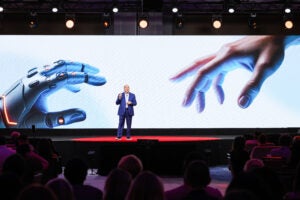Moat, ya basic.
Well, ya were basic, at least according to DoubleVerify CEO Mark Zagorski.
“One thing we did note is that Moat had a pretty basic product,” Zagorski said on Wednesday during the company’s Q3 earnings call in response to an investor asking for more detail on the Oracle opportunity.
In September, Oracle shut down all of its advertising products and services, including brand safety and verification provider Moat, leaving Moat’s former advertiser clients ripe for the pitching.
Both DV and Integral Ad Science have been in pitchapalooza mode since June, when Oracle first announced, rather abruptly, that it would exit the advertising business.
According to Zagorski, DoubleVerify has won 70% of the Moat advertiser RFPs it’s participated in, including P&G, BlackRock, Dish Network, Charter, Dunkin’ parent company Inspire Brands, Kellogg’s and Google.
Slow burn
But this was “no normal RFP process,” Zagorski said.
An RFP usually takes between three and six months, sometimes even longer if a client wants to run tests and do a deep dive into the technology.
But here, with so little time between Oracle’s original announcement and when it planned to actually pull the plug, the process was condensed into roughly six weeks.
“In many cases, it was very aggressive technical due diligence plus, you know, getting your best price out there,” Zagorski said.
AdExchanger Daily
Get our editors’ roundup delivered to your inbox every weekday.
Daily Roundup
In other words, DV knew it had to be “really, really forward” on its pricing, he said.
These client wins are flashy and have promise, in other words, but they won’t benefit the bottom line in a big way right away, said CFO Nicola Allais.
“The full revenue impact of these opportunities will materialize over a long period,” Allais said, “typically between one to three years of onboarding through our ability to upsell our social and activation solutions.”
The upsell (eventually)
Attention measurement, social media measurement and social activation are all top priorities for DV to expand beyond verification and brand safety to also include performance solutions.
Scibids, the AI startup DV acquired for $125 million last summer, is key to that plan.
Today, 15 of DoubleVerify’s top 100 customers use Scibids to optimize programmatic bids across platforms, and DV has been able to upsell Scibids to nearly 50 total customers, Zagorski said. He added that Scibids is on pace to generate $100 million in revenue by 2028.
Scibids is DV’s “core investment” on the performance side, he said, and “we’re going to start leaning into and pushing it into other parts of our business.”
Presumably, DV will also eventually upsell Scibids to its newly wooed former Moat clients.
But DV’s nearer-term goal is to become more than just a like-for-like replacement for Moat.
“Moat didn’t do social; Moat didn’t have a very robust, dynamic pre-bid suitability product,” Zagorski said. “These are sophisticated advertisers – they’re big spenders – and I think there’s a big opportunity for us down the road.”















